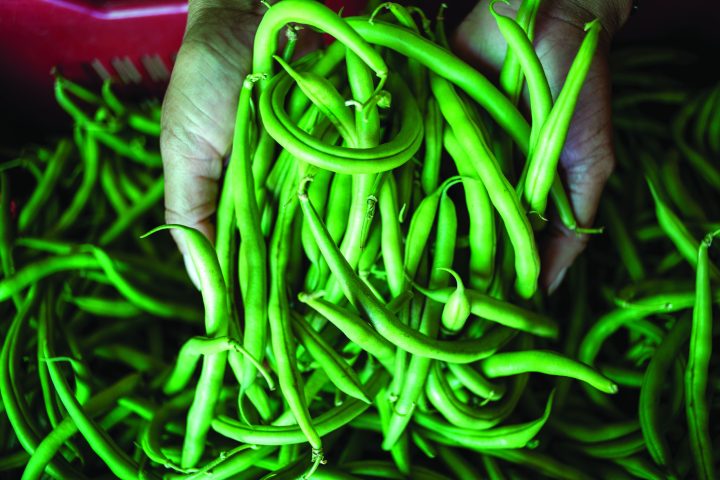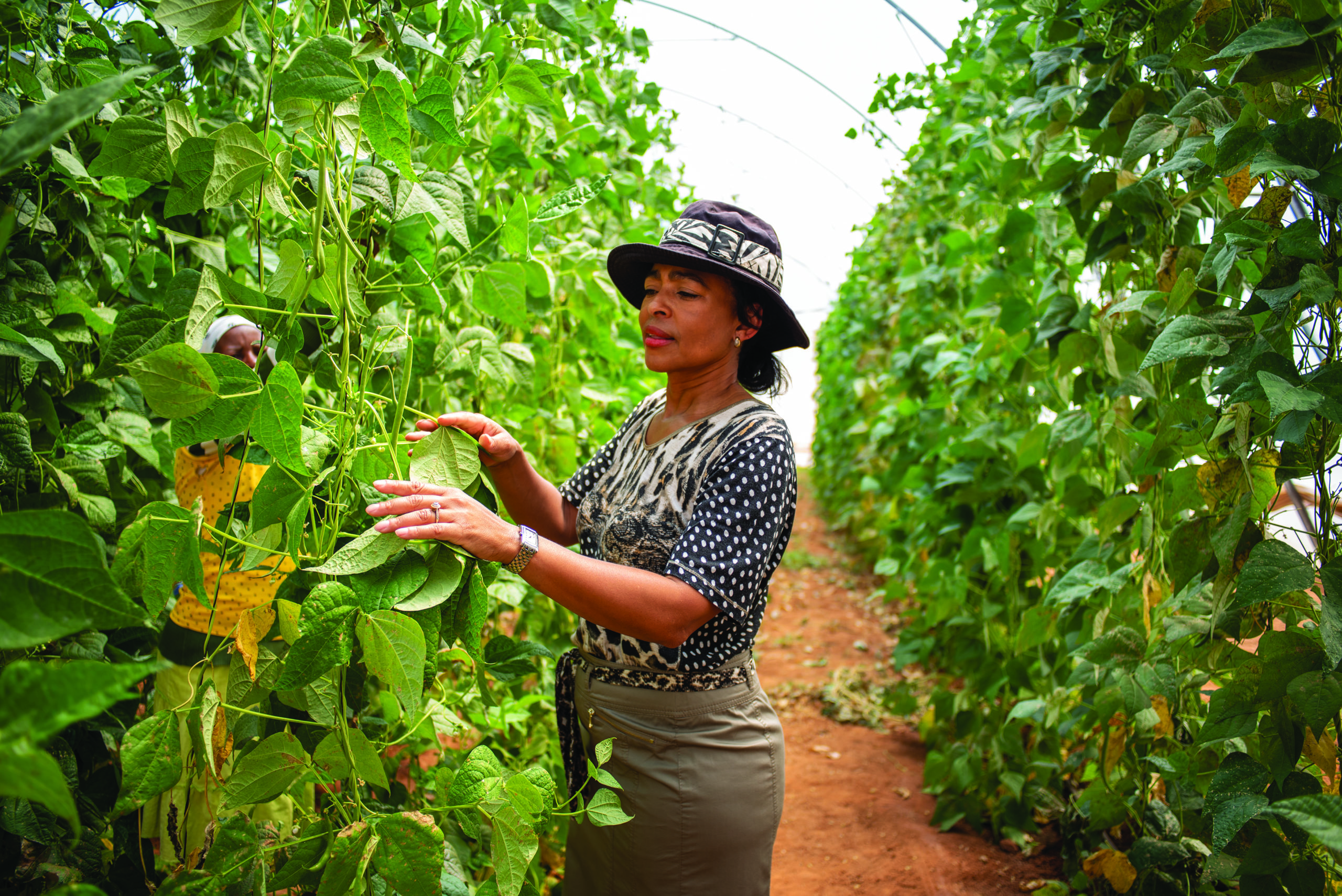SHELF LIFE #7
Former corporate executive invests in a green treasure trove

Imagine you’re a food manufacturer who wants to get their products on the supermarket shelves. These are the stories of people who did just that. In this chapter Sonto Mujakachi of Treasure Trove Farms talks about the transformational power of farming and how we can learn from one another.
Transitioning from a 20-year corporate career in Johannesburg to vegetable farmer, supermarket chain supplier and mentor of budding young farmers in conservative Brits – when you are black and female…I think you could say Sonto Mujakachi is something of an agro-entrepreneurial phenom.
In just four years, this former Eskom executive of corporate affairs has expanded Treasure Trove Farms – the farm she purchased – from the previous owner’s contract to supply Woolworths with 2,000 bunches of spinach once a week, to delivering an average of 2,500 bunches seven days a week to all major supermarket chains, along with kale, sweet peppers, cucumbers, green beans and baby marrow.
Mujakachi explains the career switch: “The whole notion of what farming can do from a transformational perspective has always been central in my upbringing.” Her grandparents farmed commercially in the 70s; her parents took over in the 80s, planting cotton as well as vegetables. When considering her corporate exit, she knew she wanted to be in that space. The subsequent road from parastatal to farming was shaped by intensive research and strategising, packed with weekend road trips while still full-time at Eskom, farm visits and discussions across desks of agricultural analysts and potential lenders.
Initially it was a toss-up between cut flowers and vegetables. She spent time on cut flower farms in Krugersdorp and Pretoria, but her mind gravitated from flowers to vegetables partly because of the notion of sustainable development. “Flowers are cyclical: you need massive farm infrastructure in order to grow them year round,” she explains. Her interest in vegetables intensified after talking extensively with a Land Bank agroeconomist, who shared the institution’s overview of the vegetable sphere.

Sonto Mujakachi, CEO of Treasure Trove Farms, inspecting a new crop of green beans. (Photo: Supplied)
While planning to buy a farm with her personal savings, Mujakachi also required a loan. “It was a multi-pronged process: I’d visit potential farms and also speak to financial institutions to learn what I needed to put forth in order to bring a bankable project to the fore. I needed to understand what the requirements were to be funded by a developmental institution such as the Land Bank.” While visiting farms, she’d spend time studying their packhouses, greenhouses and packaging rooms as well as in the fields.
The decision to grow vegetables dictated the potential farm’s size and location, with most vegetable farms either in Krugersdorp or Brits. “I was also clear that I wanted to go brown field,” meaning an established farm with infrastructure. After two years in the market, she identified a 50-hectare farm 15 minutes outside Brits. It took two more years to structure a loan with the Land Bank, which along with Mujakachi’s savings paid for the farm.
She was only the second black farmer in the area when she took over. “One of the mistakes I made was that I didn’t introduce myself quickly enough to the neighbours. This was a huge lesson I talk about a lot now. When you settle in a foreign place, it’s important to become strategic about the people you surround yourself with. I learnt a year later that had I spoken to my neighbours a lot quicker, I’d have known about some of the extreme weather patterns in Brits.”

Spinach is the backbone of Treasure Trove Farms and currently takes up about 50% of its planted land. (Photo: Supplied)
Having acquired a farm with her life savings and a loan to service, she immediately had to find another contract in addition to Woolworths to cover her costs. So she met with Pick n Pay Enterprise Development. While her farm already supplied Woolworths with bulk spinach, in order to supply a Pick n Pay distribution centre, she had to have a sealed packhouse with the required food safety certificates. She needed proper refrigeration on the farm and a refrigerated truck. Essentially a lot of things the farm didn’t have, but would need if she planned to ultimately supply Pick n Pay every day with packed produce. This necessitated a further investment in farm infrastructure.
Beyond addressing her ability to make regular deliveries to distribution centres and her packhouse certification, she also had to share financials with Pick n Pay. “They look at the viability, sustainability of your project as well as your basic cash flow…will you be able to manage if and when there are sudden changes in the environment, like Covid-19 for example. They look at a holistic view of your enterprise to see whether or not it can be sustainable. Because let’s face it, when you go to a Pick n Pay on a Sunday and are looking for cabbage, you expect to find it!”
These are all difficult barriers to entry. “For a new enterprise in the market to be able to deliver on that promise is quite a big task. I needed to look for other expertise to help me make that jump from 2,000 bunches of spinach a week to every day.”

Green beans from Treasure Trove Farms packed for Pick n Pay. (Photo: Supplied)
It took eight months to be onboarded as a Pick n Pay supplier. Today Treasure Trove Farms sells to Pick n Pay (its biggest customer), Woolworths, Shoprite Checkers and Food Lovers Market, with trucks on the road every day.
In order to grow in that first year, Mujakachi launched a recruitment drive: looking at experience on other farms, who she could train up on her own farm or take to other farms to be trained. She identified other farms in the area that were supplying Pick n Pay, and spent time in their packhouses, seeing how they were bunching in the field and packing.
“It was clear I didn’t have the requisite experience my grandparents and parents had. I was now surrounded by other commercial farmers. Because their orientation was towards mentoring new farmers, I leveraged on that.”
Farmers opened up to her. She introduced herself and told them where she was in her business. “I wasn’t fudging it; I told them I needed to learn. You have to own up to where you are in order to move and become a better supplier.” They even showed her the admin: how they invoiced, what happens when there’s a reject.
She has a lot to say about how we can all learn from each other. “I find that as farmers, we tend to be one. If a hailstorm has hit me, people tend to be sympathetic. They don’t say ‘no man, that’s a black farmer, who cares’. We are all potentially one, because our struggle is the same. There is a lot of community spirit, you have to leverage on that.”
Spinach is a year-round crop and makes up 50% of Treasure Trove’s planting. Other crops are chosen to ensure spread throughout the year. The farm employs 40 workers. “We recruit based on skill but mostly attitude. We’re looking for people who can add value to the farm and have a similar value system to ours.” Trustworthiness is key, with the need to adhere to strict certification guidelines. Half her workforce are women who mostly work in the packhouse and greenhouses. “And on my farm, we have some white staff. I believe in diversity. It’s important that we work together and leverage on the energies that we all produce.”
“To any young farmer out there, you need to understand the environment within which you operate and make sure you leverage on the skills that are in that area. You and your business must be agile and resilient enough to make the necessary adjustment.”
What keeps her awake at night is questioning if all areas of her business are functioning optimally. Every family member has a role to play, even her son, who is a third year Bachelor of Business Science student specialising in finance and accounts at UCT: “Everyone looks at an area they are passionate about and offers criticism,” she says.
She is particularly focussed on staff management, and by introducing a lot of mechanisation on the farm, she’s been able to move workers around, especially women. “I want them more in the packhouses so that they can upskill. This is more advanced farmwork as opposed to just weeding.”
About women in farming, Mujakachi has this to say: “I don’t think we make the link between women and farming enough. People don’t understand that the handbags they carry, the shoes they wear, the chunky jerseys and the beautiful silk scarves they’re wearing are all agriculture. Generally, the passion for agriculture is not ignited enough.” She believes that not enough women are entering the sector strategically enough; and we’re not doing enough research to understand where the gaps are in this sector in terms of value creation. “I think there is great opportunity to play in this space, whether in manufacturing, packaging or actual production.”
Mujakachi gets a lot of support from the Department of Agriculture, financial as well as agricultural, like knowledge sharing about the latest vegetable varieties and trends. Pick n Pay Enterprise Development has also been a huge source of strength. “They’ve helped me to access funding from other developmental institutions that offer grant funding. They also offer monthly workshops, now on Zoom, and in the past, conferences for suppliers in which we participate, covering financial issues, how to better market your product, optimise your business, leverage your relationship with bankers for better cash flow.
“I need to be very honest, right now, where I am, I have a lot of support from different quarters. It wasn’t always like that. In order to have that support, you have to reach out to as many institutions as possible. Because help is there…you just need to be able to reach out and present your case succinctly so people know who you are…and try to access whatever these institutions are putting on the table, whether government or private sector. There is a lot of funding and workshops available to assist entrepreneurs.”
Mujakachi is as passionate about mentoring as farming. “Just as I was mentored by white farmers, I find there are a lot of people who call me up for advice, come to the farm to see me and ask to be mentored.” Like the two young farmers in her area who recently started their own farms. They are learning how her packhouses work and she also assists them with transporting their goods – this means their produce is exposed to some of the supermarket groups she supplies, exposure they wouldn’t have otherwise because of their size. She also offers student learnerships: one of her learners comes from Gauteng three times a week.
Outside Brits, she’s found a place where she can grow, in all dimensions: “For the very first time, I love what I do. Each and every day I see the difference and impact I’m making, the transformation process that’s taking place in my fields …and nothing delights me like going into a Pick n Pay store and seeing that product code on the spinach and knowing it’s mine. It’s a beautiful feeling to contribute to society, to a new South Africa.” DM/TGIFood





 Become an Insider
Become an Insider